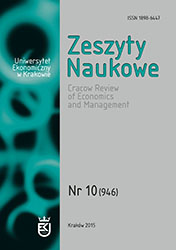Zarządzanie konfliktem w organizacji działającej w międzynarodowym otoczeniu – wpływ kultury narodowej
Conflict Management in Organisations Operating in an International Environment – the Impact of National Culture
Author(s): Jerzy SchroederSubject(s): Economy
Published by: Wydawnictwo Uniwersytetu Ekonomicznego w Krakowie
Keywords: conflict; sources of conflict; conflict management styles; national cultures
Summary/Abstract: The study compares the preferences for conflict management of employees from different national cultures. The study of the way people from different cultures manage conflict is crucial in today’s globalised world, especially in a multicultural workforce. People from different cultures often have different goals, values and assumptions concerning many aspects of conflict interaction. These differences can create conflict situations. Individualism-collectivism appears to be the most influential factor in determining how people from different cultures manage conflict. Interpersonal styles of conflict management fall into five categories: integrating, obliging, dominating, avoiding and compromising. Studies on conflict management suggest that people from individualistic cultures tend to prefer a conflict-dominant management style, whereas people from collectivistic cultures tend to prefer obliging and avoiding conflict management styles. Finally, the paper presents models for resolving cross-cultural conflict created by M. Kozan (harmony model, confrontational model and regulative model) and by C. Clarke and D. Lipp (the seven-step conflict resolution model). The findings of this study suggest that managers should consider cultural differences in conflict management when diagnosing and intervening in conflict situations in different cultures.
Journal: Zeszyty Naukowe Uniwersytetu Ekonomicznego w Krakowie
- Issue Year: 946/2015
- Issue No: 10
- Page Range: 129-140
- Page Count: 12
- Language: Polish

